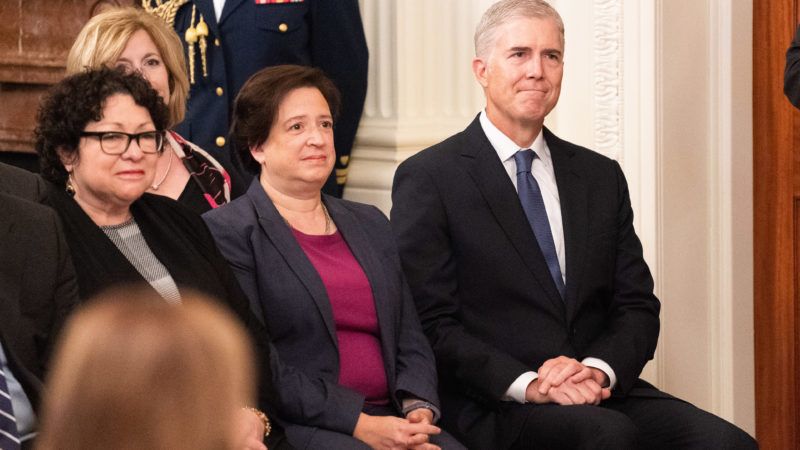Supreme Court Weighs Free Speech and the Right to Encourage Illegal Immigration
The justices heard oral arguments this week in United States v. Sineneng-Smith.

Federal law imposes criminal penalties on any person who "encourages or induces an alien to come to, enter, or reside in the United States, knowing or in reckless disregard of the fact that such coming to, entry, or residence is or will be in violation of law." On Tuesday, the U.S. Supreme Court heard oral arguments in a case that asked whether that federal law should be struck down for restricting speech that is protected by the First Amendment.
The case is United States v. Sineneng-Smith. Evelyn Sineneng-Smith, the operator of an immigration consulting firm in San Jose, California, was convicted in 2010 on several counts of illegal "encouragement." Her lawyer, Mark Fleming, told the justices that the federal law itself should be wiped from the books.
"This is a statute that uses very broad words. It uses them in the context in which all they can do is ban free speech," Fleming argued. "The result is that vast amounts of truthful and accurate and heartfelt speech that's in no way related and much less integral to any actual crime is subject to five years in federal prison. I would submit that the First Amendment is wisely designed to protect us from just this kind of law."
Several justices seemed potentially open to the merits of that argument.
"What about a charity?" Justice Brett Kavanaugh asked Deputy Solicitor General Eric Feigin. "A charity provides food to someone who's in the country unlawfully…it's designed to provide food for people who can't get it elsewhere and they know that the people taking advantage of that are here unlawfully?"
Feigin conceded that such a charity might find itself on the receiving end of unwanted federal attention. "To the extent that a charity were doing something that violated the plain terms of the statute," Feigin answered, "that amounted to giving—effectively giving money to people to—or something that is the equivalent of money to people with the purpose that those people reside in the United States unlawfully, that might violate the statute."
Justice Sonia Sotomayor made a point similar to Kavanaugh's. "I read 'encourage or induce an alien to come, enter, or reside in the U.S., knowing or in reckless disregard of the fact that such coming to, entry, or residence is or will be in violation of law,'" Sotomayor told the deputy solicitor general, and it "seems to me" that all sorts of constitutionally protected speech and activity would be in trouble. "The hospital that's treating…an illegally present child with a disease, the church who provides worship to illegal aliens," both of these real-world examples, Sotomayor pointed out, "would be a violation of the statute."
Justice Neil Gorsuch raised another First Amendment concern with the government lawyer. "What do we do about the fact that most applications, maybe not all, but most applications here of the underlying conduct would be civilly punished?" Gorsuch asked. "And here you wish to criminally punish the speech."
In other words, while it is merely a civil offense to be unlawfully present in the United States, the federal law at issue makes it a criminal offense to encourage or induce such unlawful presence. "I could be reckless in my speech in encouraging somebody [to remain in the country illegally] and wind up a federal criminal even though the underlying violation is merely civil. Is—is that the gist of the government's position here?" Gorsuch demanded. "Normally, in the criminal law," Gorsuch observed, we "don't allow punishment for speech greater than the underlying conduct itself. That would seem to be a basic First Amendment value."
A decision in United States v. Sineneng-Smith is expected by June.


Show Comments (37)